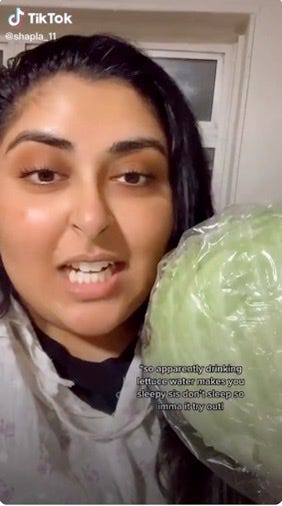
- One TikTok user used lettuce water to fall asleep, and the video now has 1.4 million likes.
- While there's some research in mice, there's no evidence that lettuce water helps humans fall asleep.
- Experts say exercise and dim the lights for better sleep.
- Visit Insider's homepage for more stories.
If you're looking to try a new sleep hack, you may want to sip on some lettuce water before bed – that's according to the latest health viral trend on TikTok.
In the video, which now has 1.4 million likes, TikTok user Shalpa Hoque poured hot water on rinsed lettuce, let it steep for ten minutes, removed the lettuce, then drank the lettuce water. After an undisclosed amount of time, Hoque said she's felt sleepy and drowsy.
"Another update lettuce has crack because your sis is gone," Hoque said in the second update.
TikTok users were quick to try out the sleep remedy – the hashtag, lettuce water, now has 18.6 million views.
But Marie-Pierre St-Onge, an associate professor of nutritional medicine and the director of the Sleep Center of Excellence at Columbia University Irving Medical Center, told Insider that there's no research on humans to prove that lettuce water helps with falling asleep.
Lettuce has been found to help mice fall asleep, but that doesn't apply to humans
While plenty of TikTok health trends aren't backed by science, lettuce extract has been found to help with sleep, but only in mice.
In a study, published in 2017, researchers aimed to see if low and high doses of lettuce extract helped mice stay asleep longer - it turns out, it did. The mice were dosed with red romaine extracts, but it's unclear which type of lettuce TikTokers are using to get more sleep.
St-Onge also said even if people used romaine lettuce, the dosage used in the study may not be the same in a cup of water. "How much of those lettuce extracts are you getting from water? I'm not sure," St-Onge said.
It may be a placebo effect
St-Onge said people may think that lettuce water helps because of the placebo effect, when you think you're getting treatment and your body positively responds to that belief.
"If you expect something to work, then you probably feel more sleepy," St-Onge said.
What actually works
But if you're looking to fall asleep faster, and get better sleep, St-Onge said there are a number of science-backed steps you can take.
1. Cut the screens
St-Onge said to avoid bright screens, like a cell phone or a laptop, when winding down to go to bed. But if that's an unrealistic step in our modern world, consider buying blue light glasses, as the device promotes better sleep.
2. Try mindfulness exercises
"Easing your mind so that you're not rehashing troubles of the day could be helpful," St-Onge said when recommending mindful exercises. Even something as simple as breathing exercises can help set a relaxing mood for bedtime.
3. Exercise your body
Exercising during the day can also help with sleep, St-Onge said. One reason being it regulates your circadian rhythm, your body's 24-hour sleep-wake cycle. It can also increase the amount of deep sleep you get each not.
4. Dim the lights
St-Onge also said dimming the lights can also help set the tone for a restful sleep. One way to help get a darker room is purchasing black-out curtains to block out the sun.